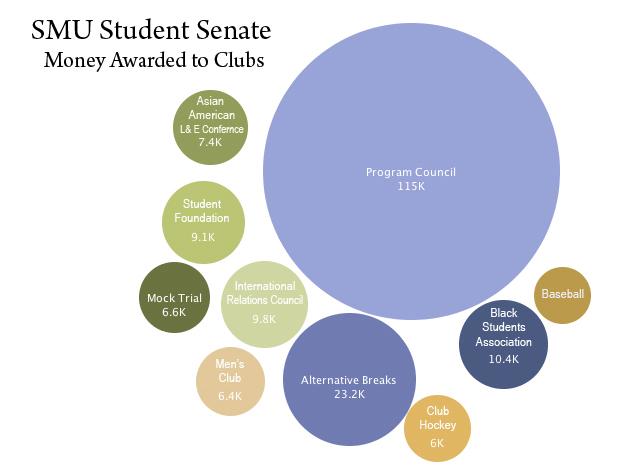
Money awarded to various student organizations by the SMU Student Senate. (Katie Tufts/The Daily Campus)
A veteran of the SMU Student Senate, Martha Pool has been involved in the organization since her very first semester at SMU. Now a sophomore, Pool figured her experience could only help her when she asked the Senate Finance Committee to providing funding for events put on by the Political Science Club, for which she served as treasurer. Quickly, she learned she was wrong.
Pool said that many funding requests for the Political Science Club were turned down, despite Pool’s knowledge of the system and her accurate and timely completion of funding applications. More troubling to Pool was how committee members made their decision. Funding decisions are made behind closed doors at a confidential budget retreat at the start of each semester. No minutes are recorded and no specific explanation is given for the reasoning behind amounts of money awarded.
Pool, who currently serves as Student Body Secretary, said, “Basically [the finance committee] can be as discriminating or fair as they want to be. They say it’s a fair process, but I don’t know if that’s true.”
Pool’s experience is not unique.
Records and interviews show that the Finance Committee relies on a seemingly arbitrary process and closed-door meetings to award hundreds of thousands of dollars to SMU clubs each year.
Rachel Fox, who chairs the Finance Committee, said committee members make these decisions in private for good reason. “I don’t want any of my committee members to be vilified and feel pressure because a member of their club is sitting in the room,” she said.
Khurran Taufiq, president of the Muslim Students Association, thinks that student organizations deserve to know what goes on behind closed doors. “I think that transparency is always good and it would help us to see the process that they go through when deciding budgets,” Taufiq said.
According to Pool, the overall budget for club funding comes from approximately $56 of each student’s “student fees” and adds up to about $840,000. Once salaries for SMU’s Comptroller and other student activities employees are deducted, the Finance Committee is left with a total of about $775,000 to award to student organizations each year.
Student organizations are required to apply for funding at the start of each semester by sending the president and treasurer to a mandatory budget meeting and filling out a budget application by a specified date.
According to Fox, the organizations that receive the most money are the ones that have maintained a good relationship with the committee. “The way residual amounts will be given out is basically organizations that we think have spent their money well in the past and just generally will benefit the student body,” Fox said.
The Program Council received the greatest amount of money for the spring semester, collecting $115,000, which accounts for approximately 30 percent of the total semester budget for club funding, according to the Student Senate budget reports.
According to the Program Council’s Facebook page, the organization is “the leader of on-campus entertainment at SMU.”
This semester, part of the Program Council’s budget was used to fund the Gavin DeGraw concert, the organization’s biggest event of the spring, for which one thousand SMU students purchased tickets.
Meanwhile, the Religious Studies Club was granted $10 for the semester, or .003 percent of the total semester budget, after requesting $380 to fund speakers and campus-wide events, according to Michael Graves, the program director for the club.
The club, which has 15 members, spent the money on stake signs, although they still had to chip in some of their own funds to cover the cost.
“When we only received $10 for the semester we were a bit frustrated,” said Graves. “We were not the only organization that was frustrated.”
The Finance Committee consists of 15 members, half of whom are members of student senate, while the other half are general members from the SMU student body. Each semester, the committee members hold a closed budget retreat where they decide which clubs will receive money and how much. At these retreats, the committee reviews budget applications and allocates funds in the order that they received them. If a club submits its application incorrectly or late, the application is sent to the bottom of the pile, according to Pool.
Aside from the word of the committee, however, there is no way for students to know what goes on at these retreats because they are not open to the student body and the committee does not release any notes from the meetings.
According to general Finance Committee member Chad Cohen, the Finance Committee spends eight and a half hours of one day allocating the $387,500 to every club for the semester. Cohen, who is also president of the College Republicans Club, said members who are involved in on-campus organizations “usually abstain from a vote” involving the budget of that club.
Although the majority of the $775,000 per year is allocated behind closed doors, Fox reassures students that they can attend weekly finance committee meetings.
“We are very public with our weekly meetings. Anybody from an organization who wants to come sit in our meetings can do so,” she said.
“It’s important to fund student organizations fairly and I don’t think the current budgeting process is fair,” said Pool. “Generally whatever the committee says goes.”









